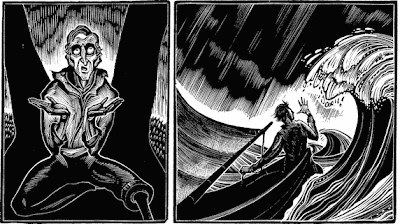
Unlikely as it seems, the author of The Sheltering Sky and the author of Huckleberry Finn share memories of summers spent in the small town of Elmira, New York.
The upstate town where Samuel Clemens spent his summers after marrying Jervis Langdon's daughter Olivia (and where he wrote much of Huckleberry Finn) is also the home of Bowles's paternal grandparents. Bowles spent several young summers there, usually en route to visit other family living in Glenora, near the Finger Lakes. Twain, after a lifetime of cigars and comment, was buried in Elmira's Woodlawn Cemetery next to Olivia in his hometown wife's family plot.
Much has been written about Bowles the irascible and prickly author, whose public persona was a defense of his own personal need for privacy. Yet he could be welcoming and encouraging to even the most offhand inquiry. Here is an excerpt from David Espey's piece on meeting Bowles in Tangier in the 1970s, after the Peace Corps volunteer wrote the author about the shared experience of days spent in Elmira. To his surprise Bowles sent Espey back a warm invitation to visit him in Tangier.
While it's an interesting literary parlor game to speculate on what the young Bowles would have said to an amused Sam Clemens, it's also interesting that both writers wrote about journeys that twist expectations: Huck Finn and Nigger Jim on the Mississippi, like the traveling couple Port and Kit in the Sahara of Morocco, become entangled in a larger culture they discover they really know precious little about.
... But my memories of Bowles go back even further, to the early 1960s, when I was a Peace Corps Volunteer in the first project to Morocco. At that time, I and my fellow Volunteers were reading with fascination a book about a poor, illiterate Moroccan named Driss ben Hamed Charhadi, an oral autobiography entitled A Life Full of Holes.In the mid-1970s I went back to the country as a Fulbright lecturer at the national university, Mohammed V, in Rabat. Before I left for Morocco, I made a visit to the Humanities Research Center to read the archives of Bowles and his wife Jane, also a writer of note. What intrigued me in Bowles’s autobiography was his memory of visiting his grandparents in Elmira, N. Y. — which happened to be my hometown and the only world I knew before I went off to Morocco with the Peace Corps. From his description, his grandparents’ house was on Church Street, just a few blocks from where I lived. I wrote to Bowles, mentioned that we had Elmira and Morocco in common, and asked if I could call on him in Tangier. He wrote back a warm letter of invitation, with the comment that he still visited the streets of Elmira, but only in his dreams. ...We began to talk of Morocco, and he seemed pleased that I knew some Moroccan Arabic. (I had been chatting with his housemaid in the dialect when he came in.) I had read somewhere that The Sheltering Sky was now being used in Peace Corps training for Morocco, and Bowles was incredulous. “What can fiction about ignorant expatriates in the 1940s, set in French Algeria, help in training community development workers?” He agreed that one of his books made from the tapes of Moroccan storytellers might offer more to Volunteers in training.By the time I met him, Bowles was writing little of his own fiction, and his main literary efforts were translations of Moroccan storytellers — Tangier residents like Mohamed Choukri and Mohamed Mrabet, both of whom I later met. Bowles was fascinated with those parts of Moroccan society which have been little affected by western civilization. In the 1950s, he traveled to remote parts of Morocco to record native Berber music which is slowly dying out, and he deplored the effects of radio and popular music on traditional Moroccan culture.In his fiction about North Africa, he has written of characters moved by such music to feats of self-mutilation. Thus he has been viewed by some as an enemy of development, a kind of primitivist. My Moroccan colleagues at the university, young professors who had been trained in the U.S. or the U.K., didn’t think much of Bowles. One of them remarked, “What would you think of a Moroccan who lived in the U.S. and presumed to understand American culture because he had spent time with the Apaches?” ...













